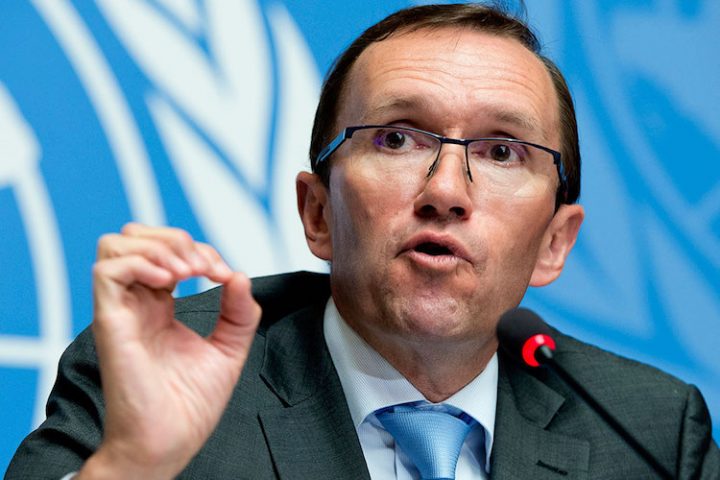As the delegations prepared to reconvene the Conference on Cyprus on June 28 in Switzerland, the United Nations envoy Espen Barth Eide said the reconvening of the deliberations was “not the last chance” but the “the best chance” of reaching an agreement between Greek-Cypriots and Turkish-Cypriots.
The talks are taking place following a meeting between the United Nations Secretary-General António Guterres and the Greek Cypriot and Turkish Cypriot leaders early June, when the UN Chief announced that they had agreed on the need to reconvene the Conference on Cyprus in June, in line with the January 12 statement of the conference.
“All agreed that the chapter on security and guarantees is of vital importance to the two communities,” Guterres said at a press stakeout at the UN Headquarters, in New York, alongside the Greek Cypriot leader Nicos Anastasiades and the Turkish Cypriot leader Mustafa Akıncı on June 4.
“Progress in this chapter is an essential element in reaching an overall agreement and in building trust between the two communities in relation to their future security,” he added.
The leaders also agreed to continue in parallel the bi-communal negotiations in Geneva on all other outstanding issues, starting with territory, property and governance and power-sharing.
The UN chief and the leaders also agreed that all issues will be negotiated interdependently, as per the joint declaration of 1February 11, 2014.
Further in his remarks, Guterres said that his Special Adviser Eide would engage with all participants in the preparation of a common document to guide the discussions on security and guarantees, based on the outcome of the meetings of the conference on Cyprus in Geneva and Mont Pelerin.
In the follow-up to this meeting, the Secretary-General will reach out to the other participants of the conference: Greece, Turkey and the United Kingdom and the European Union as an observer.
Speaking to journalists in Geneva, Eide said on June 27, “It is a unique opportunity, and it would be extremely sad if it was wasted […] and I think frankly that’s recognized by all participants,” former Norwegian Foreign Minister Eide told journalists. He highlighted however that sticking points remain between the delegations as they prepared to meet.
“Make no mistake; it’s not going to be easy,” he said, explaining that he and UN Secretary-General António Guterres will “do our utmost” to help. So would the Security Council which has remained “very united” throughout the process. Also the European Union, which is lending extremely important and productive support, and the international financial institutions, which are directly involved, would do their utmost, he added.
Foreign ministers from the three guarantor powers – Britain, Greece and Turkey – will take part in security discussions, alongside the Greek Cypriot and Turkish Cypriot leaders Anastasiades and Akinci, Eide said.
“But none of us can do it for the participants, they have to take the responsibility and try to make the best out of what I see is a unique opportunity,” the UN envoy underscored.
After decades of division in Cyprus dating back to 1974, the UN envoy said that this was the “best chance” for successful talks and not the last chance, despite the “risks” and the “tense situation” on the Mediterranean island.
There are six main topics up for discussion; they include new territorial boundaries, power-sharing and the economy. Agreement has been found on most of these so-called ‘chapters,’ broadly, and concrete progress achieved, Eide said.
The Turkish-Cypriot delegation had assented to what he called a “significant return of territory” to the Greek-Cypriots, and both sides had also exchanged maps in Geneva in January – an historic first, the UN negotiator told journalists.
Nonetheless, he said that the Greek-Cypriot and Turkish-Cypriot positions still diverge on the issue of security and guarantees.
“What I’m saying is that on these five chapters, we have made substantive process, on the issue which is most complicated right now and very much in focus now and by the guarantors – Greece, Turkey and the United Kingdom – and others who will be present, is the security and guarantees chapter; that’s where the sides are so far opposed,” he said.
“But they have also told each other and the world many times that are trying to seek a common vision also on that chapter, and that is what we are trying to do,” said Eide, insisting that this shared viewpoint is something only the Greek-Cypriots and the Turkish-Cypriots could do by talking together.
The UN would be there to help both sides find common ground, he said, so that an agreement owned by the people of Cyprus could prevail.
In a statement issued in New York, the UN Secretary-General picked up that thread saying that he welcomed the reconvening of the Cyprus Conference and that the “the opportunity for the reunification of Cyprus is now finally before us.”
Calling on all concerned players to seize this opportunity, “for Cyprus first and foremost, but also for the wider Eastern Mediterranean region,” Guterres reiterated his steadfast commitment to supporting this effort. “I urge all participants to demonstrate the will and leadership required to conclude a comprehensive settlement,” he concluded.










